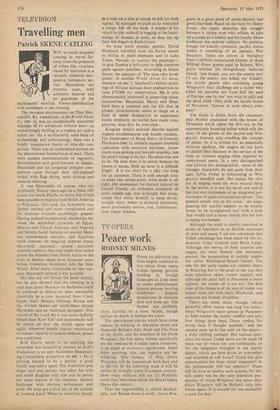TELEVISION
Travelling men
Patrick SKENE CATLING
The two-part documentary on Thor Hey- erdahl's Ra expeditions, in the World About Us (BBC 2), was an exceptionally successful example of Tv adventure without tears—as unworryingly thrilling as a trapeze act with a safety net. On a satisfactorily solid basis of archaeology and anthropology, there was a boldly imaginative theory of blue-sky con- jecture. There was an understated sermon on the international brotherhood of man. There were modest demonstrations of ingenuity, determination and good-humour in danger. Heyerdahl and his congenial polyglot com- panions came through their self-imposed ordeal with flags flying, teeth shining and cameras whirring.
It was Heyerdahl, of course, who tri- umphantly floated years ago on a balsa raft across the South Pacific, to prove that it had been possible to migrate from South America to Polynesia. This time, his hypothesis was farther fetched and more complicated and his eventual triumph accordingly greater. Having noticed architectural similarities be tween the sepulchral pyramids of Egypt, Mexico and Central America, and Negroid and Semitic facial features on ancient Mexi- can monumental statuary, and Egyptian tomb frescoes on seagoing papyrus boats, Heyerdahl reasoned, against prevalent scientific opinion, that men might have sailed across the Atlantic from North Africa to the Gulf of Mexico about three thousand years before Columbus blundered into the New World. After many vicissitudes on two voy- ages, Heyerdahl proved it was possible.
His film did not labour •the point unduly, but he also showed that the crossing in a reed boat .from Morocco to Barbados could be achieved in fifty-seven days reasonably cheerfully by a crew recruited from Chad, Egypt, Italy, Mexico, Norway, Russia and the United States—all landlubbers except Heyerdahl and an American navigator. This record of Rat and Ra II was more skilfully filmed than 'K on Tiki' and undoubtedly will be shown all over the world, again and again, whenever people require reassurance of human capacity to endure difficult, primi• tive conditions.
Rolf Harris seems to be enjoying the somewhat less demanding journey in Rolls Walkabout, a six-part Australian Broadcast- ing Commission production on BBC 1. He is proving himself to be a patriot, a good family man and a sport. The Australian .pop singer and pop painter has taken his wife and small daughter with him and he points out every feature of the remotest, dustiest landscape with obvious enthusiasm and pride. He even got a kick out of the anthills of Arnhem Land. When he rowed his family in a boat on a lake at sunset to fish for their supper, he managed to smile as he wrenched a lumpy fish off the hook. I wonder if his return to the outback is tugging at the heart., strings of Aussies in exile, as they fry up their fish fingers in Earls Court.
An even more popular painter, David Shepherd, travelled from his Surrey studio to Africa to paint elephants and to Lake Tahoe, Nevada, to auction the paintings--- to give Zambia a helicopter to help conserve game against poachers. According to James Stuart, the narrator of 'The man who loved giants', in another World About Us docu4 mentary on BBC 2, Shepherd's realistic paint- ings of African animals have enabled him to raise £75,000 for conservation. He is also obsessionately interested in preserving steam locomotives. Heyerdahl, Harris and Shep., herd have a common zest for life that in present circumstances seems to verge on a kind of noble desperation to experience exotic simplicity, no matter how many com4 plexities must first be overcome.
Kingsley Amis's satirical diatribe against student revolutionaries and faculty trendies, The Importance of Being Hairy, in Comedy Playhouse Ow 1), unfairly equated youthful radicalism with excessive hairiness, incon- tinent nose-picking and boorish stupidity, but he wasn't trying to be fair. He often tries not to be. He only does it to annoy because he knows it teases. Half an hour is a difficult length: it is too short for a play, too long for an anecdote. There is only enough time to make one strong point. Amis made it, all right. His spokesman for literacy (played by Gerald Flood), an orthodox academic of early middle age, was strikingly like Amis, except that Amis, himself, is more devas- tatingly witty, better at dialectal imitations, more profoundly serious, and, furthermore, does funny belches.






































 Previous page
Previous page